Guest blog by Dr. David Susko, Associate Professor of Biology and Bee Campus USA Chair, University of Michigan-Dearborn
Pollinators are in decline, but what can a small or medium-sized university or college do to help? As it turns out, plenty.
The University of Michigan-Dearborn was certified as a Bee Campus USA affiliate in autumn 2019, becoming the first public university in the state of Michigan to do so.
The University of Michigan-Dearborn is one of three campuses in the University of Michigan system, the others being UM-Ann Arbor and UM-Flint. Even though it is smaller than its sibling institution in Ann Arbor, UM-Dearborn has an outsized, long, and rich tradition of promoting environmental education and sustainability, especially in regards to pollinators.
Creating and Enhancing Habitats for Pollinators
UM-Dearborn first established a Community Organic Garden on campus in 1970. The garden was proposed and implemented by the Dearborn Naturalist Association, a university-sponsored student group which wanted to help foster environmental awareness. Today, the 1-acre garden consists of fifty garden plots for rent, along with theme gardens, and an enabling garden with raised garden beds accessible for people in wheelchairs or other physical limitations.
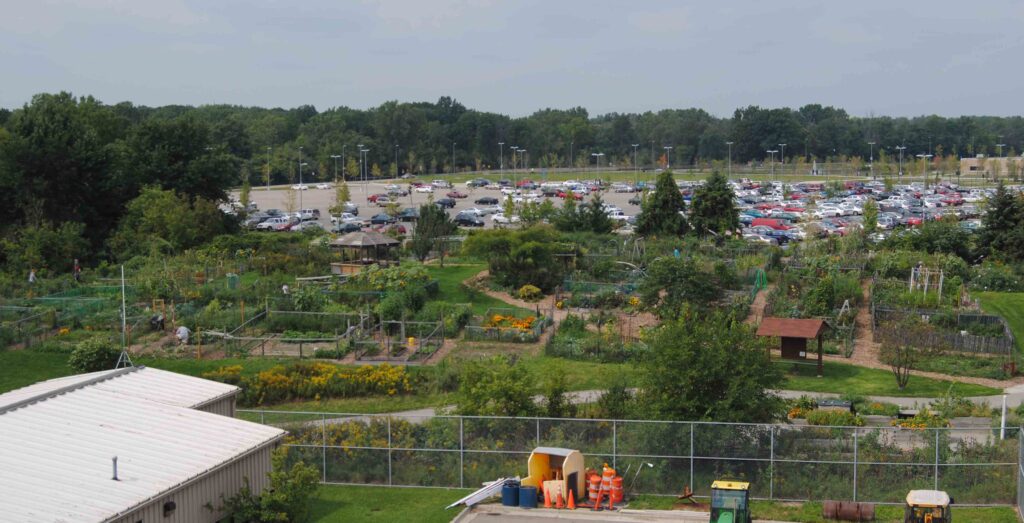
Recognizing that pollinators would benefit from additional habitat, the university established rain gardens and a pollinator garden. Native perennial plant species were carefully selected for these gardens based on a number of factors, with an emphasis on their importance as nectar sources and as hosts for egg laying and rearing of larvae for pollinators. Volunteers have been involved from the outset in the establishment and maintenance of the gardens. Frequent garden action days have involved students, staff, and the public in planting, weeding, and invasive species removal. Collectively, the gardens are recognized as a certified Monarch Waystation through Monarch Watch, a nonprofit organization that supports monarch conservation in the United States and Canada.
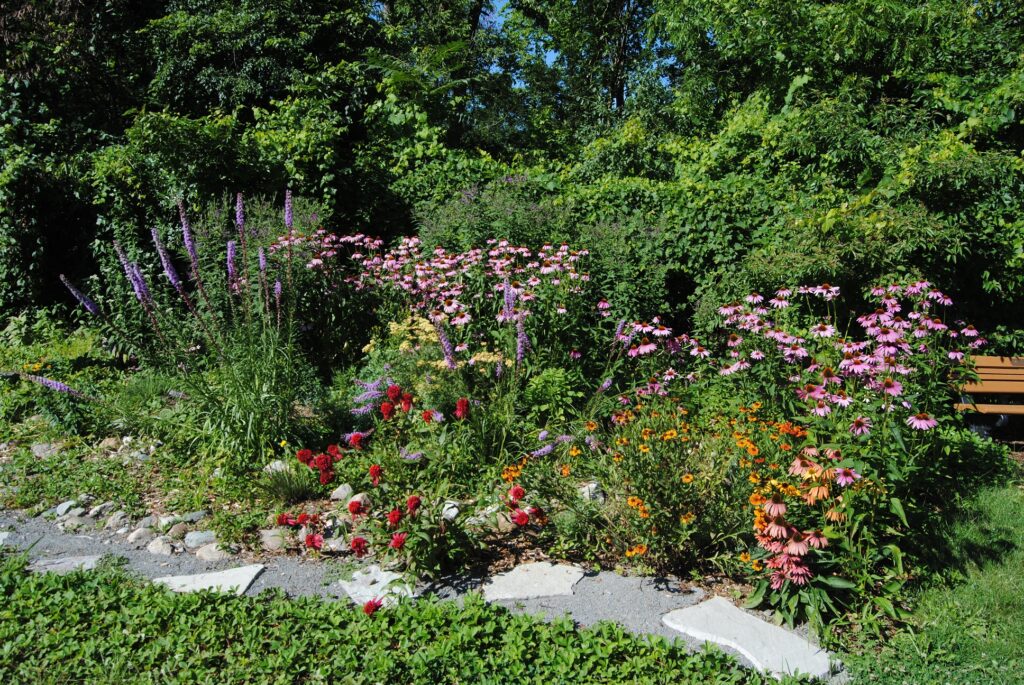
For the past several years, I have helped to design and install schoolyard gardens as outdoor learning environments at Dearborn Public Schools as part of my role in the Dearborn SHINES (School Health through Integrated Nutrition and Exercise Strategies for Healthy Kids!) Project funded by a grant from the Michigan Health Endowment Fund. This project aims to encourage and improve student health and nutrition through several healthy living initiatives, one of which involves the creation of schoolyard gardens. To date, faculty, students, and staff from UM-Dearborn and its collaborators from Wayne State University have installed new gardens at fifteen Dearborn Public Schools and one early childhood education center. Each garden includes raised beds for growing herbs, fruits, and vegetables, a raised bed for pollinator-friendly native plants, and fruit trees in a mini orchard. Students at these schools are provided with gardening supplies, garden lesson plans, and general information about soils, plants, and associated wildlife, like pollinators.
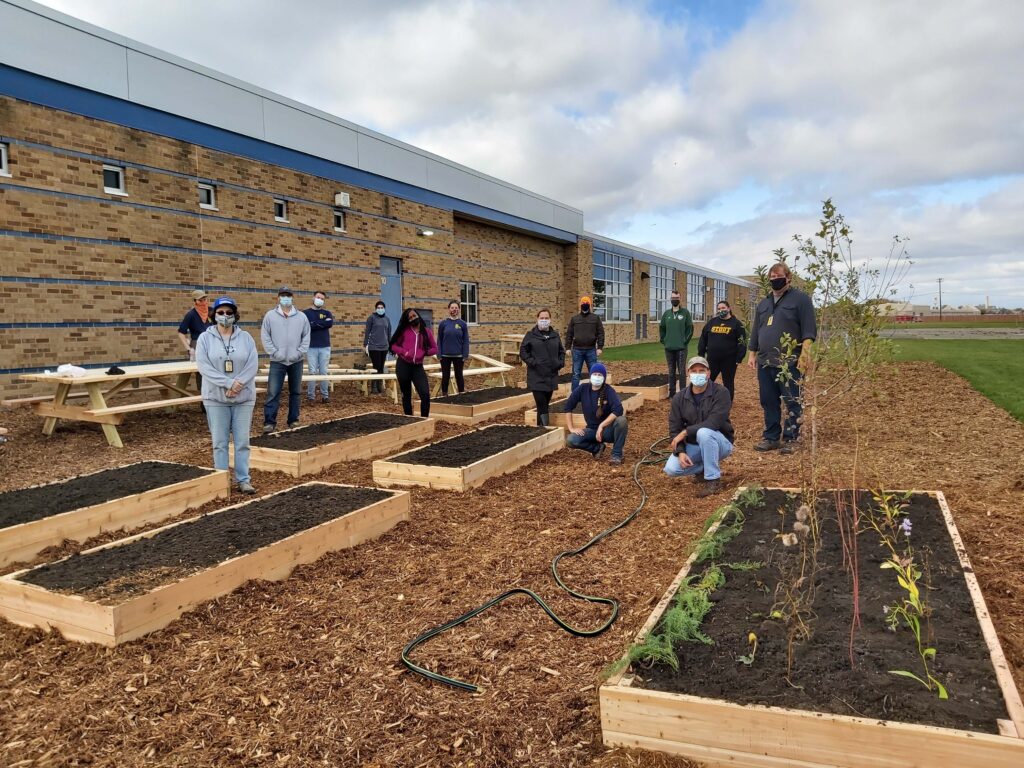
A schoolyard garden is installed at Stout Middle School, one of 8 gardens installed in 2020 as part of UM-Dearborn’s involvement in the Dearborn SHINES Project 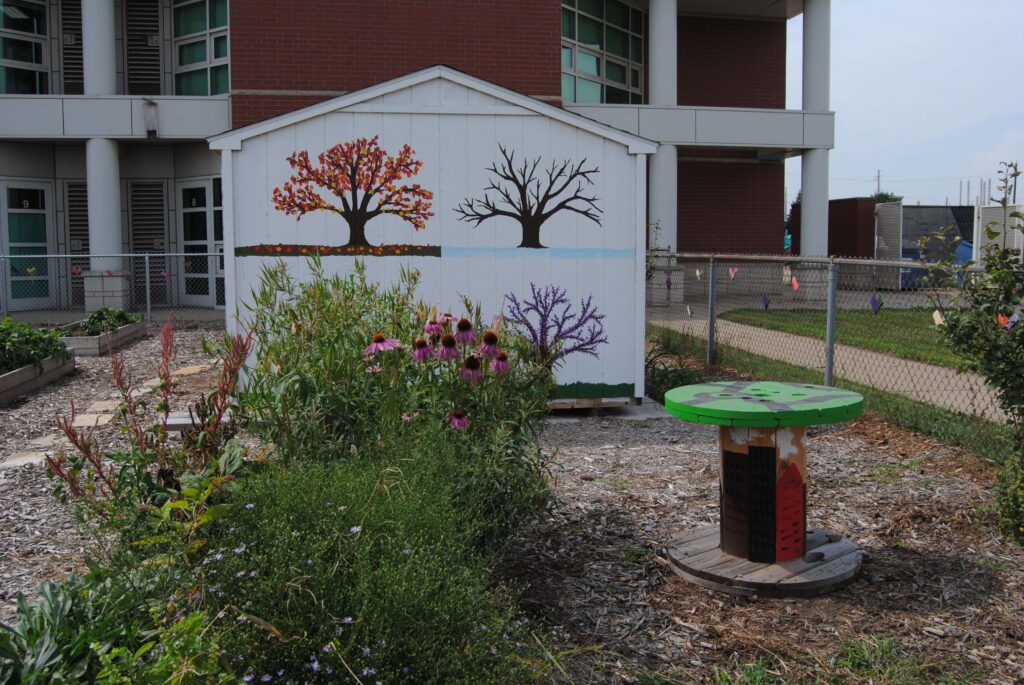
The pollinator bed in flower at Salina Elementary School’s garden
Campus and Community Engagement through Pollinator Education and Outreach
Starting in the early 1970s, faculty and students began providing free, guided environmental study programs for the region’s school children and families. Interest in opportunities for children to explore the natural world with “hands-on” discovery programs increased, and the complexity of the operations grew. In 2001, as a result of a partnership between the university and Wayne County, UM-Dearborn opened the Environmental Interpretive Center (EIC), an environmental education and research facility that serves to fulfill the university’s goal of educating the communities of southeast Michigan on urban environmental issues.
Before the covid-19 pandemic struck, the EIC would typically offer 35-40 in-person K-12 and community programs about pollinators and their habitats to nearly one thousand participants each year. These programs are led by interpretive staff and students studying in environmental fields. Specific programs include Pollination Partnerships, Understanding Insects and Spiders, and Young Naturalists. When the pandemic forced the closure of campus for in-person activities, the UM-Dearborn Bee Campus USA Committee and the EIC considered how to engage people about pollinators remotely. One outcome is the Pollinator Photo Contest. For the past two years, the public has been invited to submit photos featuring the beauty and complexity of pollinators and their habitats. The enthusiastic response has been overwhelming with hundreds of photos having been submitted, including ones from across the United States and even overseas countries like Germany, Finland, and Lebanon.
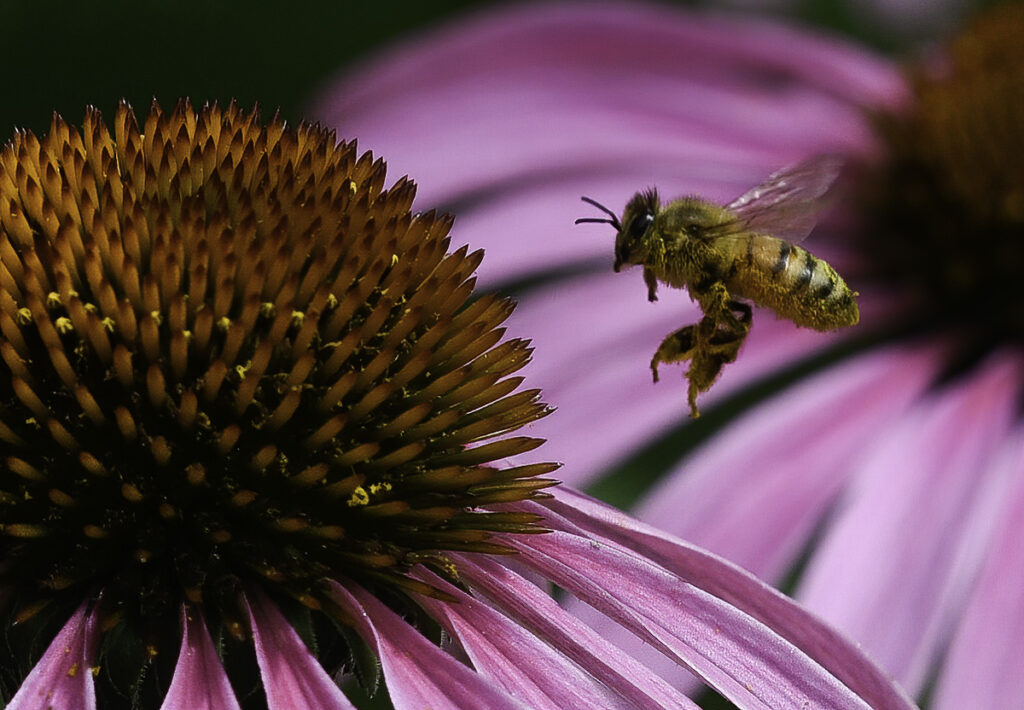
With financial support from a Ford College Community Challenge Grant from Ford Motor Co. Fund, Kaitlyn Tatro, a UM-Dearborn alumna, and myself initiated the PolliNation Project. The project is a community-wide initiative to install insect hotels in order to promote pollinator awareness and conservation. Insect hotels are human-made structures created to provide shelter and nesting sites for beneficial native pollinators. Students and faculty on campus have been intimately involved in volunteer events for the construction of hundreds of small-scale insect hotels that have since been distributed to the public. People participating in the project are educated to recognize the importance of pollinators and the ecosystem services they provide. To help identify pollinators and report their presence, Dr. Bruce Maxim, UM-Dearborn Professor of Engineering, Computer, and Information Science, recruited senior student computer science design teams to create two apps. The first is a PolliNation ID app that allows users to identify visitors to insect hotels using photos processed by artificial intelligence. A second PolliNation Hotels app maintains an online database and map featuring insect hotel locations and construction designs, along with information about local landscape features and types of pollinators observed on site. Although the pandemic has slowed the launch of the PolliNation Project, plans are underway to install insect hotels at Dearborn Public Schools, too.
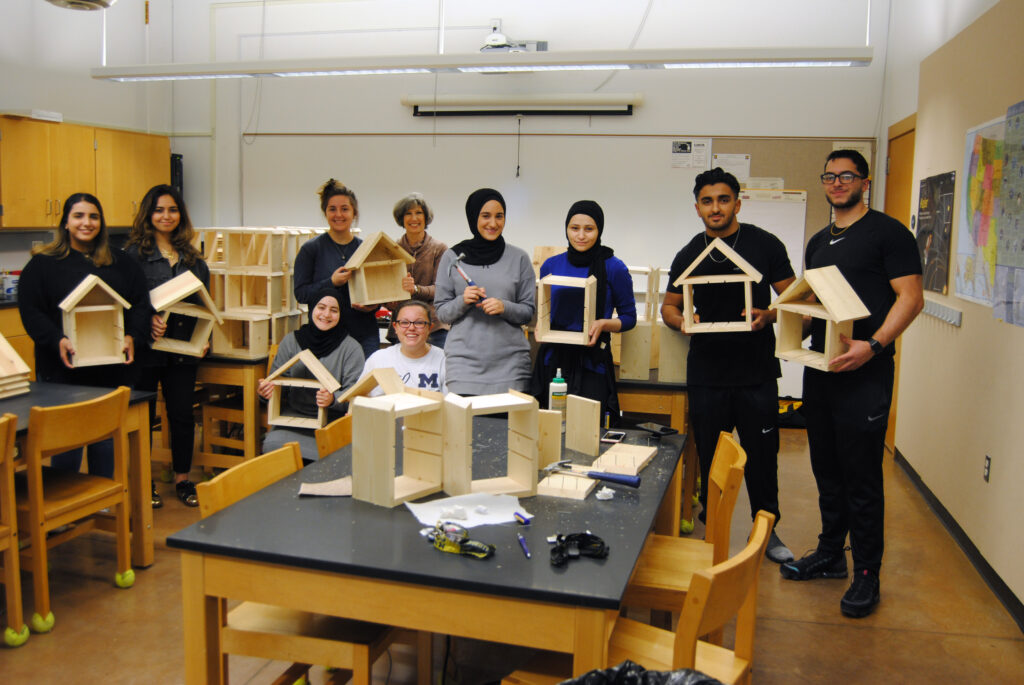
Volunteers help to assemble insect hotels for the PolliNation Project 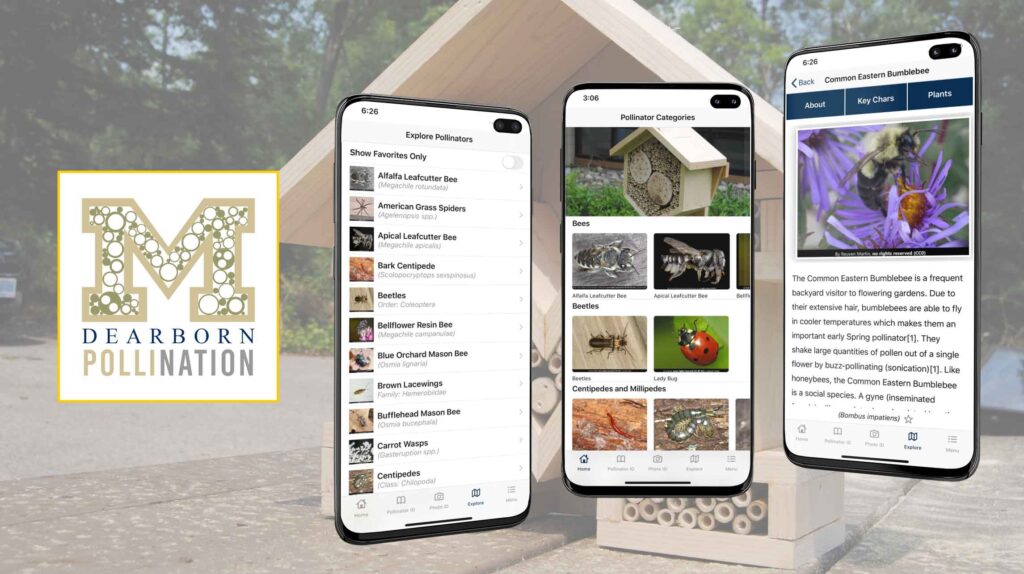
Pollinator ID App developed by computer science students working on the PolliNation Project
While there are certainly larger institutions of higher learning than UM-Dearborn, institutional size doesn’t need to limit the aspirations and opportunities of smaller colleges and universities to help promote the education and conservation of pollinators. Bee Campus USA certification has served as a catalyst for new research and outreach activities for the students and faculty at UM-Dearborn. Pollinators need our assistance, and Bee Campus USA is helping our university address this challenge.





